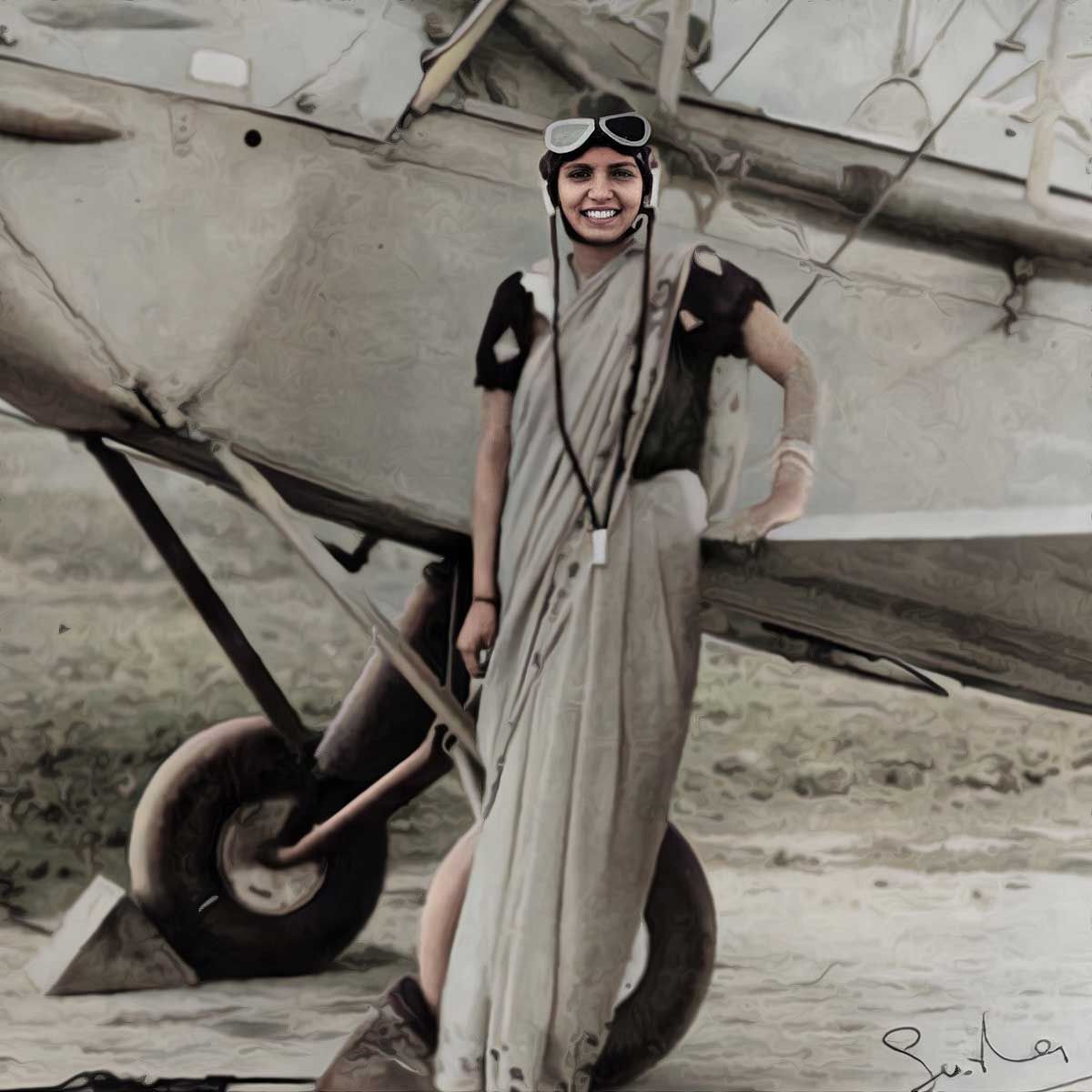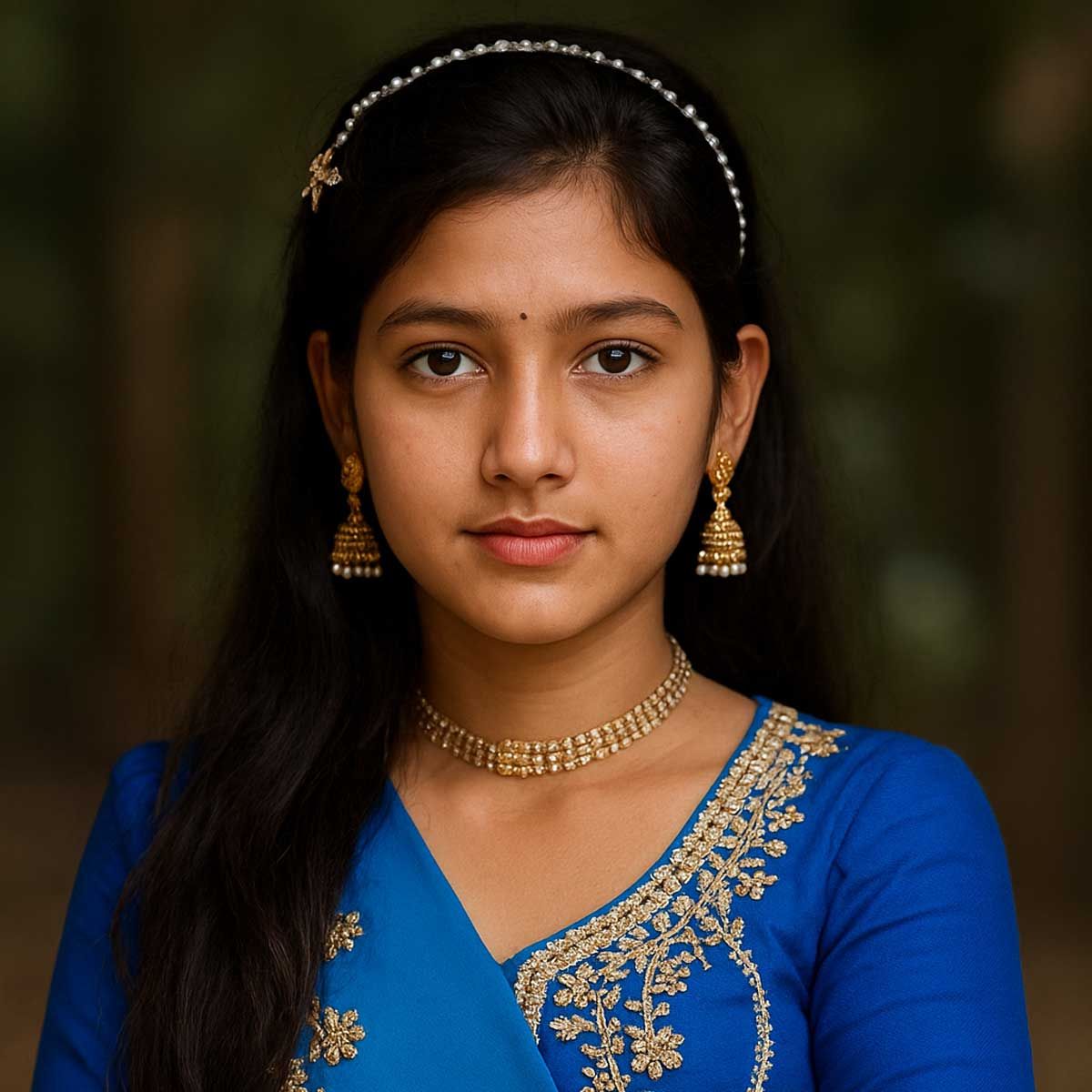Sanatan Articles
Satyaagrah
Written on
Satyaagrah
Written on
Satyaagrah
Written on
Satyaagrah
Written on
Satyaagrah
Written on
JOIN SATYAAGRAH SOCIAL MEDIA
Sarla Thakral, India's first woman pilot at just 21, defines Nari Shakti, rising in a saree amidst a male-dominated era, she transitioned as a visionary artist and designer, her legacy remains an emblem of resilience and women empowerment in India

In 1936, a period when most aspirations, especially those of women, were tethered firmly to the ground, Sarla Thakral, a young mother of 21, shattered societal norms. Flying high in the cockpit of a Gypsy Moth aircraft, Sarla, adorned in the traditional Indian saree, claimed her rightful place among the stars. That historic flight marked her indelible legacy as the first Indian woman to fly.
|
Across ages, women have been a beacon of inspiration, and their accomplishments serve as a testament to the immense potential that lies within each one of us. Today, as the clarion call for women's empowerment echoes louder, with initiatives such as the Beti Bacchao, Padhao campaigns taking center stage, India is pushing boundaries to ensure that its daughters are given their due rights. In a landscape where being a woman is often seen through a limiting lens, shining examples like Sarla remind us of the heights women can achieve if given a chance.
Many might ponder, who was Sarla Thakral? For those unfamiliar, she wasn't just any woman. Sarla was the pioneering spirit who became the first woman in India to secure an aviation pilot license. Flying wasn't just a feat; for her, it was a statement. And she made it, not in the western aviator suits, but in India's emblem of grace, the saree. At a tender age of 21, she touched the sky, proving that with determination, the sky is not the limit; it's just the beginning.
1936—a time when the very idea of flight was perceived as nothing short of miraculous. Yet, amidst this awe-inspiring era, Sarla Thakral etched her name in golden letters. Born into the bustling city of Delhi in 1921, Sarla was not one to be confined by the societal norms of her time. By the time she reached 21, she had already secured her pilot's license. And as she soared through the skies in a traditional saree, she embodied not just the spirit of flight but the essence of dreams pursued with unwavering determination.
While many young women of her generation found their dreams clipped even before they could take flight, Sarla was an exception. She was not alone in her quest; the men in her life, particularly her husband and father-in-law, played pivotal roles in her journey towards the skies.
|
Reflecting on her life, Sarla recounts, "My first husband was a pilot as were some other members of his family. After marrying him at the tender age of 16 and being blessed with a daughter soon after, both my husband, P D Sharma, and his father fervently encouraged my ambitions to fly." Her husband, a pioneer himself, was notably the first Indian to secure an airmail pilot's license, navigating the skies between Karachi and Lahore.
However, her journey wasn't without its moments of trepidation. "On nearing the completion of my requisite flying hours, my instructor was keen on me flying solo. But with my husband away, I requested a brief pause until his return," she narrates. But once her wings were spread, Sarla's trajectory knew no bounds.
Highlighting the overwhelming support she received, Sarla states, "With the unwavering backing of my family and the camaraderie of the fellow trainees, there was scarcely a word of doubt. The lone inquisitive query came from a clerk at the flying club. Aside from that, I met no resistance." A testament to her indomitable spirit, even at the age of 91, she remains fiercely independent, managing all her affairs single-handedly.
"I believed in self-reliance," Sarla Thakral had once remarked, her words echoing the essence of her life's journey. "Every moment was precious to me. Whether it was skipping the customary afternoon nap or managing my own kitchen, I found joy in doing things on my own." Such a spirit wasn't just confined to words for Sarla; it was her very ethos. In her time, she was revered as the epitome of vitality in her community, even being recognized as the 'fittest senior citizen' in her locality.
Rewind to 1936, and you'd find a younger Sarla making waves in an arena overwhelmingly dominated by men. As she nestled into the cockpit of a GYPSY moth, adorned in a saree, her determined stance spoke louder than words. At a time when the very notion of women passengers raised eyebrows, Sarla was already scripting a groundbreaking narrative of audacity and aspiration, setting a new precedent in Indian aviation.
|
|
Having married PD Sharma at 16, she had embarked on a new chapter in her personal life. However, her professional passion took flight five years later, at 21. By then, she wasn't merely a wife but also a mother to a four-year-old. Her husband, the pioneering airmail pilot flying between Karachi and Lahore, became her pillar of strength. Sarla often recounted, "PD Sharma's family was steeped in aviation, with nine pilots in their ranks. Their collective passion and expertise gave me the thrust I needed."
Her exceptional prowess in flying became so evident early on that her instructor, after just over eight hours of training, declared her fit to fly solo. Her dedication and skill set her apart.
However, life's unpredictable twists cast a shadow on her soaring journey. The tragic plane crash in 1939 that claimed her beloved husband's life was a blow. With over 1,000 flying hours to her credit and her 'A' license secured, Sarla was on the cusp of earning her 'B' license. This would have paved the way for her to captain commercial planes. But fate intervened. The outbreak of World War 2 suspended civil training, putting her immediate aspirations on hold.
Defeat was a word Sarla Thakral never acknowledged. When the winds of life shifted unfavorably, she harnessed her inherent strength to soar higher, choosing different skies.
Reflecting on the challenging phase after her husband's demise, she had recounted, "Following the tragic crash in 1939 that took my first husband from me, I journeyed to Jodhpur with hopes of obtaining a commercial pilot’s licence. But the onset of World War II disrupted those plans, leading to a suspension in flying activities. Thus, I returned to Lahore, opting for a different artistic pursuit." Her enrollment in the Mayo School of Art marked the beginning of her tryst with the Bengal school of painting, from where she eventually earned a diploma in fine arts.
Her abode showcased her multifaceted talent. Elegant watercolors, predominantly of women, hung alongside her own portraits, bearing witness to her artistic prowess. Another surprise was her dexterity in crafting costume jewelry, each piece a testament to her attention to detail. But her skills didn’t end there. Sarla proudly displayed her immaculate calligraphy, revealing a fondness for inscribing shlokas from the Vedas which she often gifted to friends. "In our era, there was a significant emphasis on good penmanship. It disheartens me to see the quality of handwriting in today’s younger generation," she had lamented.
Sarla's adherence to the principles of Arya Samaj simplified her decision to remarry, given the sect's endorsement of widow remarriage. Fate had another chapter of love written for her. She crossed paths with P. P. Thakral upon relocating to Delhi post the tumultuous Partition, and they began their journey together.
Post her aviation chapter, Sarla Thakral channeled her creative spirit into diverse avenues. She carved a niche for herself in the realm of design, with her costume jewelry gracing the elite of her time, and her saree designs becoming highly sought after.
In a conversation with The Tribune back in 2006, she had reflected on her multifarious endeavors. “I dabbled in designing costume jewellery, which was not only worn by the who’s who of that time but also supplied it to Cottage Emporium for 15 years. Thereafter, I embraced block printing, with the sarees I designed becoming quite popular. That chapter, too, spanned 15 years. Subsequently, I collaborated with the National School of Drama for designing, yet painting remained a constant through these shifts,” she detailed.
Known fondly as 'Mati', Sarla's drive was evident in her approach to work. She had shared, "When I commit to a project, be it painting or design, I believe in seeing it through to completion. Although with time, it has become a tad challenging to sit for extended durations, my spirit remains indomitable and I persist." Her tenacity and zest for life were truly commendable, illustrating that Sarla's journey was not just about breaking barriers in the sky but also about creating waves on the ground.
Sarla Thakral's achievements went far beyond her historic flight. Through life's ups and downs, she held onto her guiding principle, a simple yet profound motto. “From my days as a girl guide, I’ve clung to a belief: always be happy,” she had once shared. “After all, humans, unlike animals, have been bestowed the unique gift of laughter. Embracing this joy, this mantra, has steered me through many a storm.”
To many, Sarla Thakral was the pioneer in the skies, the first Indian woman pilot. However, her legacy was much broader. Whether as an innovative designer, an artistic painter, a formidable businesswoman, or a guiding light for countless women and men, Sarla was a beacon of resilience and achievement.
Even giants in technology recognized the magnitude of her contributions. Google, in a heartwarming tribute, dedicated a doodle to her on her 107th birthday, reflecting the global reverence for this trailblazer.
Her story was not just of breaking boundaries; it was a testament to the unyielding human spirit. She exemplified that with unwavering belief and a clear vision, one could surmount any challenge. In her words, a mantra she hoped to impart to the newer generations, “Always be happy, it is very important for us to be happy and cheerful. This one motto has seen me tide over the crises in my life.” Through her actions and her words, Sarla Thakral remains an embodiment of inspiration, urging each of us to chase our dreams with a smile on our faces.
 |
 Support Us
Support Us
Satyagraha was born from the heart of our land, with an undying aim to unveil the true essence of Bharat. It seeks to illuminate the hidden tales of our valiant freedom fighters and the rich chronicles that haven't yet sung their complete melody in the mainstream.
While platforms like NDTV and 'The Wire' effortlessly garner funds under the banner of safeguarding democracy, we at Satyagraha walk a different path. Our strength and resonance come from you. In this journey to weave a stronger Bharat, every little contribution amplifies our voice. Let's come together, contribute as you can, and champion the true spirit of our nation.
 |  |  |
| ICICI Bank of Satyaagrah | Razorpay Bank of Satyaagrah | PayPal Bank of Satyaagrah - For International Payments |
If all above doesn't work, then try the LINK below:
Please share the article on other platforms
DISCLAIMER: The author is solely responsible for the views expressed in this article. The author carries the responsibility for citing and/or licensing of images utilized within the text. The website also frequently uses non-commercial images for representational purposes only in line with the article. We are not responsible for the authenticity of such images. If some images have a copyright issue, we request the person/entity to contact us at This email address is being protected from spambots. You need JavaScript enabled to view it. and we will take the necessary actions to resolve the issue.
Related Articles
- Unsung Heroine Pritilata Waddedar, Who Shook The British Raj at the age of 21
- Santi Ghosh and Suniti Choudhury: Two Teenage Freedom Fighters Assassinated British Magistrate
- Jhalkaribai: The Indian Rebellion Of 1857 Who Took on British Forces Disguised as Laxmibai
- Operation Trident,1971: How Indian Navy Pulled Off One Of Its Greatest Victories over Pakistan, Karachi burned for seven days
- History books should teach India’s civilisational, linguistic heritage, not unfounded claims: Parliamentary Committee meets to discuss NCERT books
- A new symbol of Hindutva pride, Shri Kashi Vishwanath Temple Corridor
- When in a special referendum in 1975 people of Sikkim chose India over monarchy to become the 22nd State of the Indian Union: Rule of the Chogyal king and his mysterious American Wife Hope Cooke ended
- Can Communism and Democracy Coexist - 100 Years of Russian Revolution
- Assam King Prithu who badly defeated Bakhtiyar Khilji, destroyer of Nalanda University in Battle of Kamrup in 1206 CE
- A Great man Beyond Criticism - Martyrdom of Shaheed Bhagat Singh (Some Hidden Facts)
- 21-yr-old girl Bina Das shot Bengal Governor in her convocation programme at Calcutta University, got Padma Shri but died in penury
- Hero of Pawankhind: Veer Maratha Bajiprabhu Deshpande, who led 300 Soldiers against 12000 Adilshahi Army defending Shivaji
- Our first true war of independence lie forgotten within the fog of time and tomes of propaganda: Sanyasi Rebellion, when "renouncers of the material world" lead peasants in revolt against British and fundamentalist islamic clans
- Gandhi emphasized that he won't salute Indian National Flag if Charkha is replaced by Ashoka Chakra and wanted British flag added to it
- How Britishers were challenged by 83 year old Ropuiliani in Mizoram in 1892-’93





















